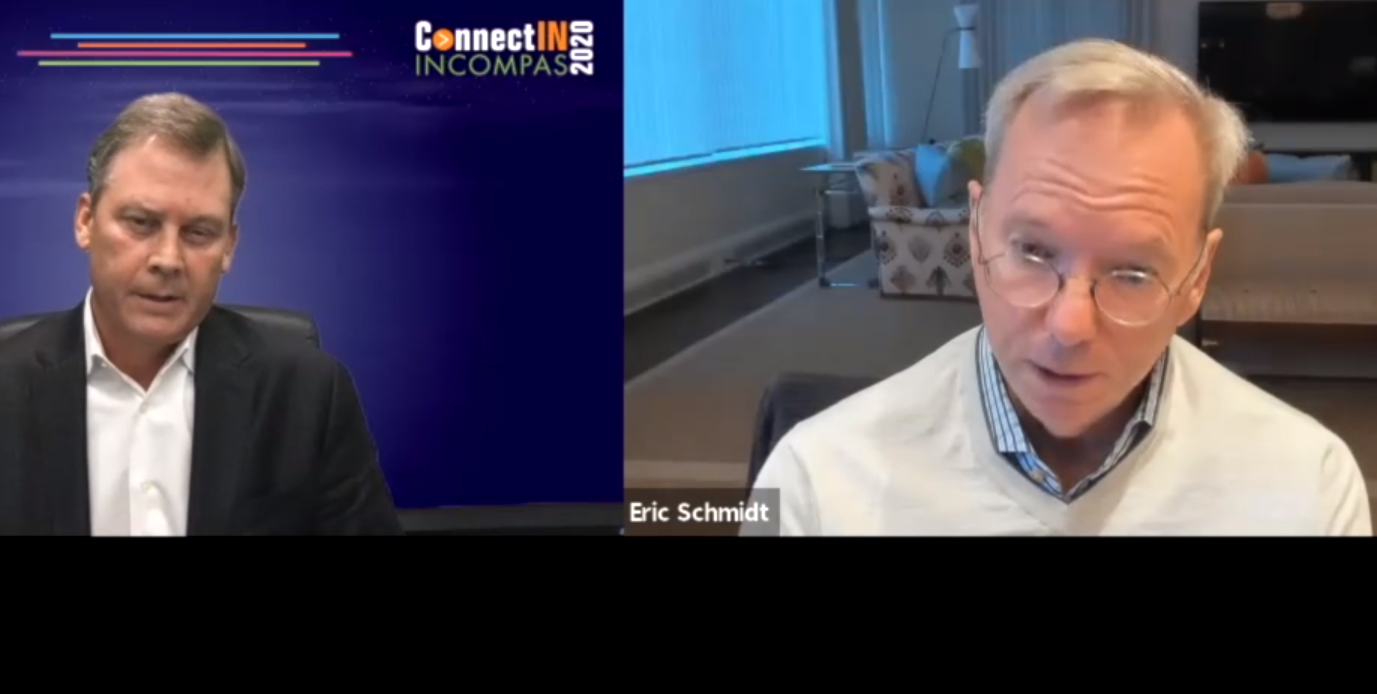Ex-Google CEO Schmidt: Catching China in 5G Race Is National Emergency
Says FCC midband spectrum clearing/auction process is too slow approach

The smarter way to stay on top of the multichannel video marketplace. Sign up below.
You are now subscribed
Your newsletter sign-up was successful
Former Google CEO and spectrum sharing apostle Eric Schmidt said China has won the first-to-market 5G race and that it is imperative that the U.S. free up midband spectrum from the military via dynamic sharing, rather than band-clearing and FCC auctions, to help catch up.
Schmidt was speaking at the INCOMPAS 2020 virtual show Wednesday (Sept. 16) in a virtual Q&A with association president Chip Pickering.
Pickering said who gets to 5G first is key because whoever wins the first 5G network wins all of the applications of the future and asked what would be the fastest way for the U.S. to get there. Schmidt had a sobering response: "I am sorry to be so unpleasant about this," said Schmidt, "but China has already won that race, so we are definitely playing catch-up. It's a national emergency."
Related: FCC Flags More Chinese Telecoms
Schmidt, who just stepped down after four years as chairman of the Defense Innovation Board, said the FCC's process of reclaiming spectrum and auctioning for 5G is popular because of all the money it raises for the treasury, but that it is not the best way to get 5G spectrum to market fast, which is imperative.
He also said sharing would actually produce more revenue, including gross revenue because of greater productivity.
Schmidt said military-use midband spectrum currently used for radar systems would take a decade to clear and auction via the current FCC approach. By contrast, he said, getting the Defense Department to issue an RFP for the buildout of a private network that the military could use via dynamic sharing could happen in two or three years.
The smarter way to stay on top of the multichannel video marketplace. Sign up below.
"We need to get spectrum to the telecom folks, he argued, and more and faster than those FCC auctions," he said, pointing out that China has freed up 200 MHz of midband spectrum and just gave it to the telecoms with buildout conditions--which he would also impose in the U.S. RFP model.
While China is projecting 120 million 5G users by year's end, there are probably no more than one or two participants in the audience for INCOMPAS' virtual Q&A that had 5G, Schmidt argued.
Related: Commerce Expands Huawei Restrictions
He conceded that the Defense Department has announced that sharing will, indeed, be at the core of its strategy, but that DOD, the FCC and the National Telecommunications & Information Administration are not on the same page when it comes to how that happens.
But it needs to happen, he said.
Schmidt said sharing is no longer a technology issue. It can be done. For instance, he pointed out that there is not a lot of call for naval radar (which uses midband spectrum) in the middle of the country.
Echoing comments by Sen. Mark Warner (D-Va.) in a speech earlier in the day, Schmidt said that the FCC needs to become a player in the 5G stack of the future and not cede that territory to Chinese telecom Huawei--"trust me you don't want to use Huawei," he added. He was OK with Samsung or Nokia or Ericcson, but suggested there should be a U.S. player on that list as well.
Schmidt said he and the Obama Administration had both erred in not realizing that, while they were on the same page about the need for sharing, they did not realize that they would have to "force" the availability of spectrum.
Contributing editor John Eggerton has been an editor and/or writer on media regulation, legislation and policy for over four decades, including covering the FCC, FTC, Congress, the major media trade associations, and the federal courts. In addition to Multichannel News and Broadcasting + Cable, his work has appeared in Radio World, TV Technology, TV Fax, This Week in Consumer Electronics, Variety and the Encyclopedia Britannica.

